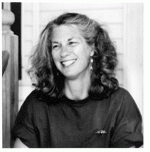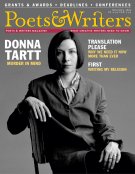Young writers may find it difficult to imagine the derision with which some publishers dismissed women poets as recently as 30 years ago. Betsy Sholl hasn't forgotten it; she received rejection letters that read, "Sorry, we're not interested in poems about your mother; we're not interested in kitchen table poems." And so, in 1973—the year in which the passage of Roe v. Wade legalized abortion and the debate over the Equal Rights Amendment reached the half-century mark—Sholl, along with four other women and two men, all members of a Boston poetry workshop, founded Alice James Books, a "poetry cooperative." The press has since published about 130 books by an eclectic list of poets including Jane Kenyon, Fanny Howe, B.H. Fairchild, Timothy Liu, and Rita Gabis, and it will celebrate its 30th anniversary with a yearlong schedule of events in 2003.

"We decided not to wait for the imprimatur of some middle-aged, middle-class, middle-road, male authority figure," says Sholl of the founders' initial aims: to publish exclusively poetry, with an emphasis on works by women; to require that all poets published become members of the cooperative for two years; and to make all decisions by consensus of the members.
Named after the posthumously published writer (and sister of William and Henry James), Alice James Books has been affiliated with the University of Maine at Farmington since 1994. According to Director April Ossmann, who joined the staff in 2000, that affiliation has served both the press and the university. "They give us free housing, technical support, and some operational support, and we train 20 to 25 interns per year in publishing," Ossmann says. "It's a brilliant idea; they have one of only ten BFA programs in poetry in the country, and it's the only one with a required internship." The press sponsors a reading series of Alice James poets at the university and supervises production of its literary journal, the Sandy River Review. The press, however, remains editorially and administratively independent.
Despite its university affiliation and the presence of three staffers (a director, a managing editor, and an editorial assistant), the press has remained true to its cooperative origins, publishing roughly six books per year. Cooperative members select manuscripts from submissions to two annual competitions: those for the Beatrice Hawley Award, given for a book of poems by a U.S. poet, and the New England/New York Award, given for a book of poems by a resident of the region. Each winning poet receives $2,000 and book publication. Only the winners of the regional award are expected to fulfill what's now a three-year commitment to cooperative membership, which involves judging contests, making such "executive decisions" as whether to hire a fund-raising consultant, and assisting new members. They also receive a month's residency at Vermont Studio Center in Johnson, Vermont.
"I don't think when I started out I would have chosen to make a commitment to a cooperative board," says Brooklyn poet Matthea Harvey, whose book Pity the Bathtub Its Forced Embrace of the Human Form won the New England/New York Award in 1999. "But often if you get a book published you're sort of handed off; instead I felt very involved in the process." Harvey valued having a role in the book's design, she says, especially of the cover, which at her suggestion features one of her sister's paintings. Both Harvey and New York City poet Tom Thompson, winner of the 2000 New England/New York Award for Live Feed, say that choosing winning manuscripts from the hundreds of submissions is the most rewarding aspect of working with the press. "There's a lot of arguing and serious reading going on" among the eight or so members at the group sessions, Thompson says. "To be able to stand behind a manuscript, you have to bring to it everything you have as a reader, and the process is the better for it. As a reader, I'm the better for it." And he's a better writer for his participation, he says. Thompson used suggestions from members to compose a "pretty radical" revision of his book, and he has suggested revisions to other winners as well. Of the workload Thompson says, "I'm not sure I could sustain this for ten years, but I can sure do three."
Ossmann sees such author loyalty as one of the benefits of the collective process, and she hopes to involve many of the more than 90 "living Alices," as she calls the press's poets, in anniversary celebrations next year. She has invited colleges nationwide to sponsor readings; the poets in turn will donate to the press any honoraria they receive for the readings. Also planned is an anniversary reading by four Alice James authors at the Associate Writing Programs Writers Conference in Baltimore from February 26 to March 1, and a gala event in New York City next fall.
Alice James Books has avoided the usual pitfalls of small cooperatives by limiting the terms of its members (it publishes no more than two books by any one author) and by its commitment to publish a wide diversity of poets. Over the years, the focus on publishing works by women has changed. Today, Ossmann says, manuscripts are selected "without any thought of gender," a policy that evolved gradually. "There's a misperception that because we were a feminist press we don't publish men," she says. "The situation has changed considerably for female poets. Things have evened up pretty nicely." In addition, the press acquired national distribution through Consortium Book Sales & Distribution in June, which has resulted in "a huge increase in sales," Ossmann says.
And she's very optimistic about the future, as is Sholl, who hasn't been involved with the press since the mid-1980s and now lives in Portland, Maine. "I had friends who were dismissive of it at the beginning," Sholl says. "Now I meet people who say it's their first choice to send their books to. That's pretty gratifying."
For more information, contact Alice James Books at 238 Main Street, Farmington, ME 04938; (207) 778-7071; www.alicejamesbooks.org.
Joy Jacobso is a poet and editor who lives in Brooklyn.









